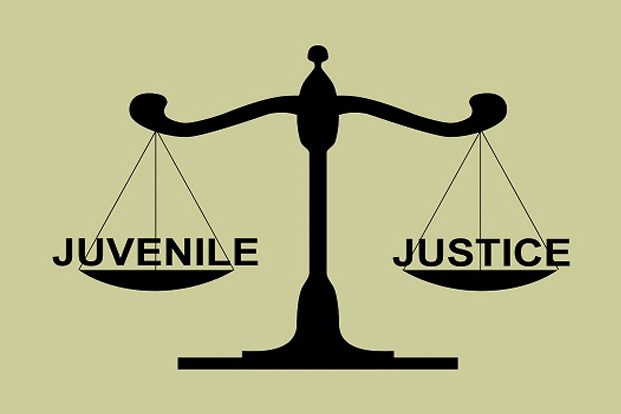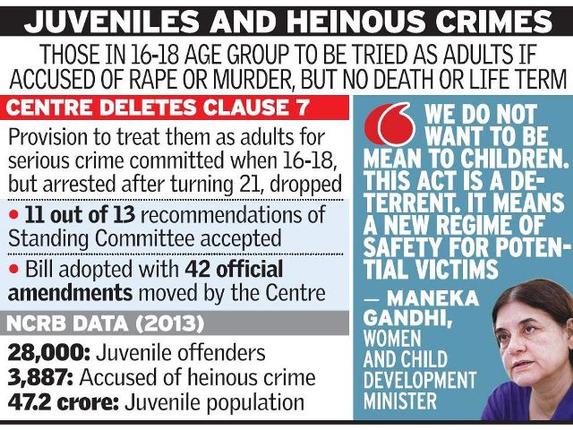The much hype over the juvenile bill has finally come to an end.
Parliament on Tuesday passed the juvenile justice bill, a day after members cutting across party lines agreed that the important legislation should be taken up immediately.

Easyshiksha hereby outlines the features of this bill and mention what the previous bill proposed.
The bill provides for the trial of those between 16 and 18 years of age as adults for heinous offences. Also, anyone between the age of 16 and 18 who commits a less serious offence may be tried as an adult if he is apprehended after he attains the age of 21.
Important Announcement – EasyShiksha has now started Online Internship Program “Ab India Sikhega Ghar Se”

- Juveniles aged 16-18 accused of heinous crimes (rape, murder) to be tried as adults
- Could face imprisonment up to 7 years but won’t get life sentence or death penalty
- Juvenile Justice Board to decide if every accused minor should be tried under Juvenile Justice Act or in regular trial court
- Juveniles convicted under the regular justice system cannot contest polls and are ineligible for government jobs
- Corporal punishment has been made an offence and is punishable between 6 months and 3 years in jail
- Employing a child for begging will invite up to 10 years in jail
- Use of children by militants will carry up to 7 years in jail
 Online Courses with Certification
Online Courses with Certification
Empower your team. Lead the industry
Get a subscription to a library of online courses and digital learning tools for your organization with EasyShiksha
Request NowThe law at present
Currently, a juvenile accused (under 18 years) is tried by the Juvenile Justice Board and if convicted, sent to a reform home for a maximum of 3 years — as in the case of the recently-released convict in the December 16 , 2012, gang rape.
ALSO READ: Education Sector in India
Get Course: Data Structure
Q. Are EasyShiksha's internships truly free?
Yes, all internships offered by EasyShiksha are completely free of charge.
Q. How can I apply for an internship with EasyShiksha?
You can apply by visiting our website, browsing available internships, and following the application instructions provided.
Q. What types of internships are available through EasyShiksha?
EasyShiksha offers a wide range of internships across technology, business, marketing, healthcare, and more. Opportunities are continuously updated.
Q. Will I receive a certificate upon completing an internship?
Yes, upon successful completion, you will receive a certificate recognizing your participation and achievements.
Q. Are EasyShiksha's internship certificates recognized by universities and employers?
Yes, the certificates are recognized by universities, colleges, and employers worldwide.
Q. Is the download of certificates free or paid?
Access to internships and courses is free, but there is a small fee to download certificates, covering administrative costs.
Q. When can I start the course?
You can choose any course and start immediately without delay.
Q. What are the course and session timings?
These are fully online courses. You can learn at any time and pace. We recommend following a routine, but it depends on your schedule.
Q. What will happen when my course is over?
After completion, you will have lifetime access to the course for future reference.
Q. Can I download the notes and study material?
Yes, you can access and download course materials and have lifetime access for future reference.
Q. What software/tools would be needed for the course?
All necessary software/tools will be shared during the training as needed.
Q. I’m unable to make a payment. What should I do?
Try using a different card or account. If the problem persists, email us at info@easyshiksha.com.
Q. Do I get the certificate in hard copy?
No, only a soft copy is provided, which can be downloaded and printed if required.
Q. The payment got deducted but shows “failed”. What to do?
Technical errors may cause this. The deducted amount will be returned to your account in 7-10 working days.
Q. Payment was successful but dashboard shows ‘Buy Now’?
Sometimes payment reflection is delayed. If it takes longer than 30 minutes, email info@easyshiksha.com with the payment screenshot.
Q. What is the refund policy?
If you face technical issues, you can request a refund. No refunds are issued once the certificate has been generated.
Q. Can I enroll in a single course?
Yes, select the course of interest, fill in the details, make payment, and start learning. You will also earn a certificate.
Q. My questions are not listed above. I need further help.
Contact us at info@easyshiksha.com for further assistance.






































































